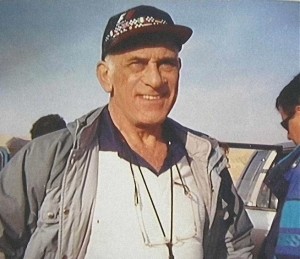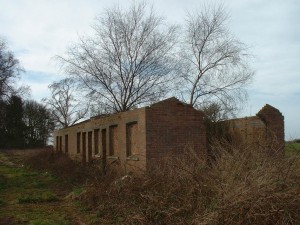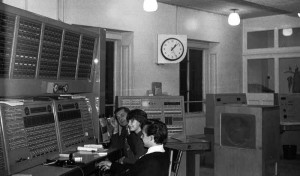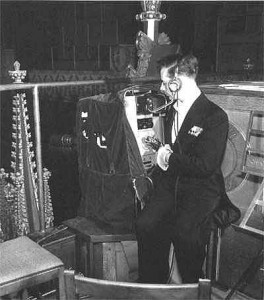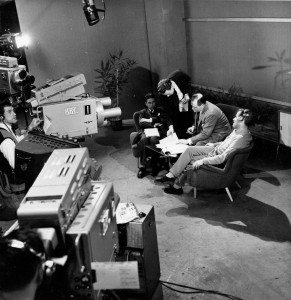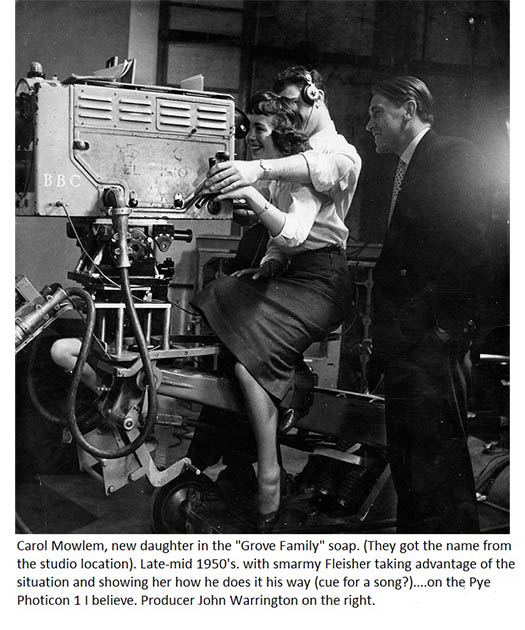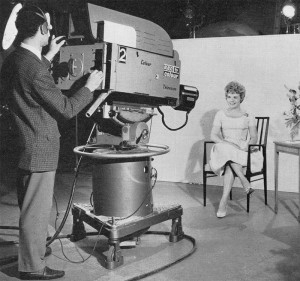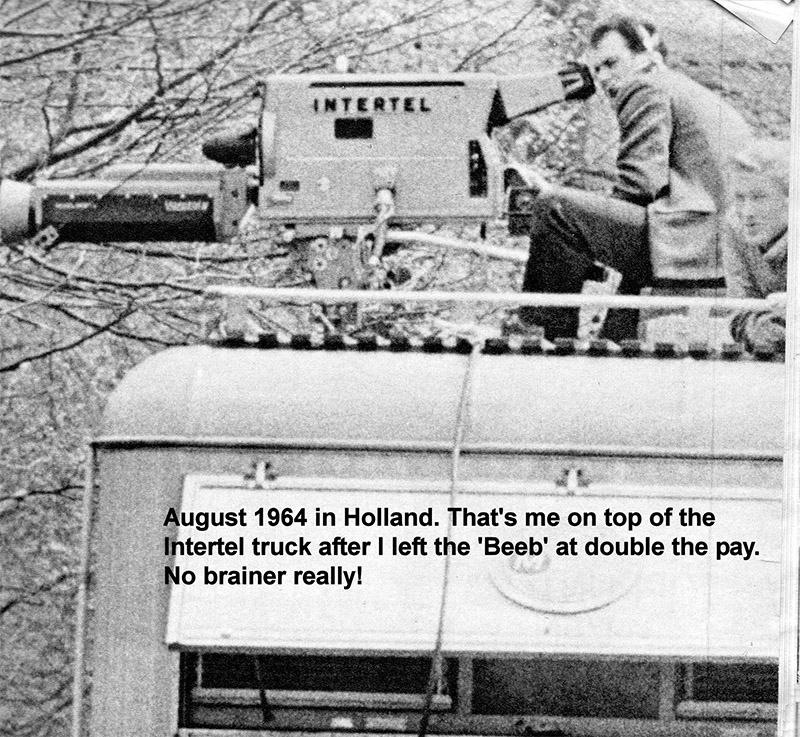I recently read the article here “Clive Leighton – his working life” and was absolutely fascinated by the similarities in our respective BBC backgrounds…..although it actually goes back even further in that we were both born the same year and both experienced similar aspects of WWII.
I lived with my shopkeeping parents just off Baker Street in London. During that time, after spending nearly two years as an evacuee in Oxfordshire, I returned to London. Bombs were still falling and my father, who was part of the local fire-watching team, sometimes got me to do his shifts for him. At that age it seemed all rather fun because the possibility of being blown to bits didn’t really seem real. I also recall on one occasion a land mine exploding quite close by which blew out the windows of the two adjoining shops either side but left ours totally unscathed. Just the way the pressure wave went. The one owner of both shops either side was cursing like a trooper the following morning as he swept up all his broken glass and looking daggers at our untouched shop front.
I also recall walking along Oxford Street when a V1 buzz-bomb (doodle bug) went spluttering low over the roof tops with a Spitfire running alongside waiting to reach open space (Regent’s Park was en route) before he tipped it over with his wing-tip hopefully before it stopped on in own accord and exploded in such a heavily built-up area. Those pilots were amazing.
After the war my parents kept the shop but bought a residential property in Westcliff-on-Sea so we became commuters until I was 18 and called up into the RAF for National Service. Just like Clive, and many others I’ll warrant, we were all asked what trade we would like to select…. which had no bearing on where we ended up. The fact is whatever they were short of at the time was where you were sent (I later discovered the BBC adopted the same selection process). I was half-way lucky in choosing radio operation and was sent to AGRS in Yatesbury, Wiltshire but to be trained as a radar operator (well, it could have been a cook or an office-walla -just the way the cookie crumbled).
After trade training I opted for an overseas posting. Needless to say the closest I got over any sea was the North one at Felixstowe in Suffolk from where we were ‘garried’ in daily to the radar station at nearby Trimley Heath.
And how is this for yet another coincidence. Many of you London-area tech-ops bods will know Paul Kay. We now live quite close and recently discovered, by chance, that we both did our National Service at that same station at the same time. He was in radio and I was in radar. Further, whilst I was there I was also a member of the station band (drummer) and quite recently I got a telephone call out of the blue from another ex-bandsman who had tracked me down. We recently had a reunion and, brother, did the memories flood back although, now in my dotage, by the time I manage half way up the stairs, I have totally forgotten why I am there!
At my BBC interview I opted for the new burgeoning television service as a cameraman and showed them plenty of my most ravishing box-brownie photographs to reinforce the application so naturally was instead sent to Bush House World Service radio division as a control room engineer trainee. Oddly enough one of our demobbed RAF station officers was also working there on production. They say, if you stand in Piccadilly Circus long enough you will eventually see everyone you have ever met, known and wish to have known. I say, if you can just remain standing up long enough the same applies!
OK. I quite enjoyed it at Bush but listening to the news in forty languages was not my ideal except very occasionally one of the language services would put on a short jazz programme.
I recall Humphrey Littleton’s band in the studio on one occasion. Four shifts system over 24 hours, four days, four mornings, four nights and four days off…..well only three and a half really because the first day off was sleeping after a night shift. Clive mentioned that as a grams op he would have to check the turntables (as did we in each studio) and the record used for that was a 78 rpm “Teddy Bear’s Picnic”. I always thought that choice was peculiar to Bush House. Gosh, did THAT bring back memories. As I recall the flip side was entitled “Hush, hush, hush, here comes the bogey man” or something similar. Whoever dreamed up that record for grams checks?
It was at this time, after my father had died and my mother sold the Westcliff property, that we moved into a flat in Tottenham Court Road. Normally I would drive to Bush House but there was one day when it wasn’t possible, the roads were blocked off in most of central London, however it wasn’t all that far for me to walk. I knew the television service was largely encamped in Trafalgar Square to cover the Queen’s coronation down the road in Westminster Abbey, the Square was indeed covered with broadcasting vehicle of all types, radio, television and foreign broadcasters. As it was on my way to Bush House and I had a pass I stopped off to watch all the frenzied activity, popped in to a scanner for a while, and so wished I was part of it.
As I continued walking along I saw placards announcing Edmund Hilary (later Sir) had conquered Everest. What a momentous day although for my part I was designated to man the Italian service continuity suite and so heard all the ceremony in Italian…non capito!
I was sent on attachment for a few months to Radio OBs. Again I was fascinated with this new type of operation, setting up temporary control rooms and placing mics. All live. Being a musician myself I would particularly like covering variety shows. dance bands and concerts from theatres, ballrooms and hotels. On one occasion a featured American songstress who may have been perhaps five years my senior (so old!) made a very obvious play for me as I was packing up the gear when the broadcast was over and invited me to her hotel room for a ‘drink’ . I was a young, good looking Jack-the-Lad in those days and considered myself way above being classified in my own mind as an older woman’s play thing so I declined. The stupidity of youth, eh? Where is she now?….hope all is forgiven.
In due course I saw on the notice board vacancies for tech.ops TV. With indecent haste I put in my application for a board. To give the Beeb (although in my day it was referred to as ‘The Corp’) their due any member of staff, whatever their rating, position or location was entitled to apply for any advertised internal vacancy.
And so it came to pass I achieved my dearest wish. Spent some time in induction and was sent to Lime Grove for the first day of my many years in television. As I stepped hesitantly into Studio G I was immediately welcomed by the crew and given the job of swinging the Mole arm. Yes, they were so short of bods they had to put a complete first-day newbie in
such a responsible position. Some hurried pointers from the senior cameraman and we were on the air. I was in heaven. I can clearly remember the name and storyline of the programme, one of a series entitled “Nine Day Wonders”. I can also remember ogling the make-up girls and thinking ‘This is my Life’ (how many of those did I eventually do?). The year was 1952/3. Sixty years on and although my memory fails half-way up the stairs…..I am also still ogling.
At around that time ITV were granted their licences and they were desperately recruiting staff from the BBC at unheard of salaries, hence the shortage of technical staff. Where else could they get them from? I opted to stay on the premise that with all the trained staff left and leaving there would be great opportunities for rapid advancement and so it came to be. I quite quickly moved up the ladder from cable bashing to cameras 4,3,2 and even 1, usually with a change of crew each time. There were three trips to Evesham during my time there. (Now what was that secretary’s name that showed me the sunken bath at Wood Norton Hall?)
As a training ground the BBC was superb. Although I had opted for my main interest in camera operation I also enjoyed the variety of sound boom operator and grams ops on many occasions also inlay/overlay, vision mixing, etc. You name it we had the opportunities and were encouraged to do it for a vast variety of shows from children’s and women’s hours to religious programmes, interviews, major dramas and large-scale musicals. The list was endless.
So, back to my early days. I was now a fully-fledged cameraman…in name… but not all that experienced yet. I was once on the front end of a motorised crane doing a musical show in G using the then Pye Photicon Mk 1 cameras. They were very insensitive and always
operated with the iris fully open (f 1.9) so you can imagine the depth of field….and you would need a good imagination as there wasn’t any. In other words, focus was very critical. It was a Ted Heath band show with singer Dennis Lotis. Nice guy but I didn’t do him any favours. I had this long shot from the back of the studio tracking into a close up. There were no zoom lenses in those days. As we continued inexorably forward I saw the picture begin to soften and so tweaked the focus handle to compensate but somehow it never seemed to actually click in and of course it was changing all the time. Now sweating profusely I was desperately attempting to find focus right up to the close-up by which time Dennis Lotis’ face was little more than a ghostly blur…..and until I too am a ghostly blur I still shudder at the memory together with the overriding recall of the deathly silence from the gallery until the mesmerised director snapped out of it and screamed “cut to 2”. I tried to convince myself I had created a new art form and everyone was too awe-inspired to speak.
Some old wrinklies might remember HD started long before the 21st Century. In the 1950’s there was a company in Highbury called ‘High Definition Films’ They used B/W cameras modified to work on 1100 lines progressive, nearly three times the then 405 line interlaced broadcast system. The output was recorded off a special monitor on to film. They couldn’t directly transmit of course but made quite a number of productions for telecine transmission. I visited them once and it was weird to see the effect of such a high line structure. In today’s vernacular “cool”.
Over time the many experiences gave me great satisfaction and pride. Being bussed up to ‘Ally Pally’ to do the news from Studio A, levelling up the captions board with a length of string to each corner, and later on attachment to Ally Pally to man the ColourTest experiments, using the enormous Marconi modified RCA colour cameras (the coffin) that
took nearly two hours to line up prior to transmission when the B/W service shut down at night. Sometimes I also shot 35mm film for inserts. Once I was sent to Wales for a drama OB from a makeshift studio and so it went on. It was almost unheard of for a studio-based cameraman to be sent on an OB. It was strictly horses for courses in those days and ne’er the twain should meet. I did apply once for a film cameraman board but didn’t get it. In retrospect just as well.
I had ten glorious years with the Beeb, enjoyed every minute of it, especially when I WAS good enough to be called an experienced BBC cameraman and was able to prove it.
I left the maternal bosom of the Beeb to accept a much better paid job as cameraman with a new mobile facilities unit, Intertel, based firstly in Munich and later in Switzerland.
It was at that time I got married . Just before I left I happened to mention to Bryan Cowgill where I was off to and he asked me to take photographs of any sporting events we covered abroad and send them to the sports office. It sounded like a nice little extra earner but the truth is that when manning a tv camera at a sporting event there is precious little opportunity to leave it running whilst taking your own stills.
At that time we were the only such broadcast unit in Europe although there was a chemical company that ran a similar unit for their own commercial and promotional purposes and they even went to colour before the UK colour service started.. We had one large main control truck with four Marconi Mk IV cameras, racks, vision and audio control rooms and some very large cable drums attached to the outside rear. The other truck had two 2” 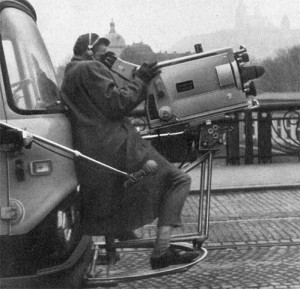 Ampex 1000 Quad recorders and associated equipment. Many boring hours checking tapes for drop-outs before use. We travelled all over Europe, both East and West covering a variety of OB’s and studio shows, musicals, doco’s, news coverage, interviews, often with well-known political and show biz personalities including Hollywood stars also TV commercials and lots of sporting events, etc. Our customers were mainly US, UK and European broadcasters. We were a mixed ‘Tower of Babel’ bunch, Americans, French, English and German and wonder of wonders, we all got screen credits on every show we did. The BBC still doesn’t credit the camera team although I have occasionally seen a credit for camera supervisor, mainly on big OB’s.
Ampex 1000 Quad recorders and associated equipment. Many boring hours checking tapes for drop-outs before use. We travelled all over Europe, both East and West covering a variety of OB’s and studio shows, musicals, doco’s, news coverage, interviews, often with well-known political and show biz personalities including Hollywood stars also TV commercials and lots of sporting events, etc. Our customers were mainly US, UK and European broadcasters. We were a mixed ‘Tower of Babel’ bunch, Americans, French, English and German and wonder of wonders, we all got screen credits on every show we did. The BBC still doesn’t credit the camera team although I have occasionally seen a credit for camera supervisor, mainly on big OB’s.
There were one or two occasions on larger shows or Olympic events when we needed more cameramen or lighting engineers and it fell to me to re-visit my old stamping grounds and convince some buddies to apply for some annual leave or DOIL’s to cover their illicit moonlighting activities. My American bosses were more than happy to know the 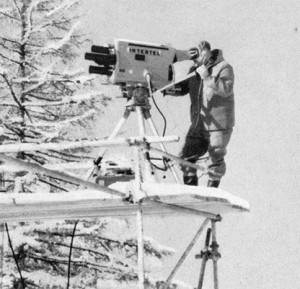 temporary people I roped in were all BBC trained. No questions were asked nor doubts expressed about their capability. No names mentioned but they are now either dead or long retired so safe from retribution, as am I. Let’s face it the BBC has always and still does have a unique quality cachet. One one occasion, as an independent and long after I had left broadcasting as a staffer, I was booked to cover an event at a Middle Eastern Ambassador’s establishment. When I arrived I was greeted not with the question “are you the video man” but it was “are you the BBC man”, and again many such times after. It was beginning to dawn on me just how much those initials meant to most people around the world.
temporary people I roped in were all BBC trained. No questions were asked nor doubts expressed about their capability. No names mentioned but they are now either dead or long retired so safe from retribution, as am I. Let’s face it the BBC has always and still does have a unique quality cachet. One one occasion, as an independent and long after I had left broadcasting as a staffer, I was booked to cover an event at a Middle Eastern Ambassador’s establishment. When I arrived I was greeted not with the question “are you the video man” but it was “are you the BBC man”, and again many such times after. It was beginning to dawn on me just how much those initials meant to most people around the world.
We had a very English sound assistant with the mobile unit. Again, right out of the blue one day not so long ago he tracked me down and telephoned from America where he has lived for many years and become a totally, avid, perhaps rabid is more accurate, ultra-dedicated US citizen and very anti Obama to boot. We agreed to keep in contact by email but instead of talking about our common experiences in Europe he just keeps on raving about his love of America and hate of their current President so communication has somewhat floundered in one direction.
In due course I returned to England and became a freelance TV cameraman. There were only two of us in the country at that time being rather unique and both kept fairly busy not only with TV stations but with an increasing number of independent production outlets serving the broadcasters. How times change. It is now difficult to find a cameraman who isn’t freelance.
It was in 1963 that I was offered a job with Vinten as a sales manager. Of course I knew well their range of camera mounting equipment, heads, dollies and cranes, etc. but in fact to them this was merely a useful addition to the real requirement of managing their European agency division representing Mitchell 35 and 70mm motion-picture cameras. Mitchell’s tagline was “98% of the world’s feature motion pictures are shot with a Mitchell” and it was true at that time. Arri was then just a cheap man’s alternative, mostly just 16mm (look at them now). Selling was a whole new experience for me but the pride I had in handling such a prestigious product gave me great satisfaction. My first task was one of many subsequent trips to Hollywood visiting the Mitchell factory and all the studio centres to learn all about it. Then travelling all over East and West Europe and Russia to promote and sell their products and to arrange booths at technical exhibitions. I then decided to 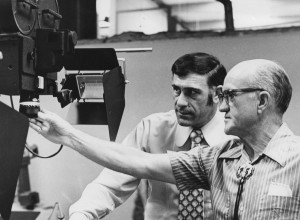 expand the agency division, was given permission and I took on board quite a number of associated film, film-laboratory and audio-visual products, mostly of American manufacture. Some of my customers then became TV stations at each of which throughout the UK I met old workmates from the BBC who had moved on to pastures new.
expand the agency division, was given permission and I took on board quite a number of associated film, film-laboratory and audio-visual products, mostly of American manufacture. Some of my customers then became TV stations at each of which throughout the UK I met old workmates from the BBC who had moved on to pastures new.
After ten years I resigned from Vinten to take up a position as Sales and Marketing Manager for a company based in Staines, Middlesex. They manufactured precision motion-picture printers and animation stands and I brought some of my agency products with me.
My ten years with that company had me travelling all over the world a number of times and I considered myself very lucky to visit so many fascinating places I would otherwise never have seen and what is more at no cost and some comfort to myself. I also introduced myself to their existing overseas agents and appointed new ones where necessary to include the new products and continued to organise exhibitions.
Eventually television and video technologies started to overtake motion-picture technology and the move was now towards electronic media resulting in my being made redundant but I had a plan. I would revert back to my first love of television. I acquired a few bits of necessary equipment, cameras, lighting, audio and editing and started my own small production company working from home and that is where I am at still. I was lucky enough to become reasonably successful at the start and earn enough to keep body and soul, wife and children and the mortgage together added to which I started freelancing again and this provided a welcome boost to my income. I have now got to the age where I enjoy working in the editing suite and doing conversions and disk production and the like but am decidedly picky about the type of shoots I accept that might involve anything too strenuous like climbing up mountains with heavy cameras and cables in the snow….yes I did that…. or travelling great distances without adequate compensation.
I have also done quite a lot of teaching video techniques in various media colleges and theatre schools, including the NFTS in Beaconsfield. Most colleges churn out hundreds of inexperienced and often ill-advised “wannabe’s” who will labour at anything for nothing just to get some experience in this ‘glamour’ industry. The guys and girls that do make a living are very fortunate and of necessity very talented compared to the many hundreds who finish up shelf-stacking in Woolworth’s……yes I know Woolworth’s doesn’t exist any more so you get my point. I am in the happy position of saying “I don’t work nor use my experience, expensive equipment and insurance coverage for nothing” but most indi producers and some of the stations these days just want everything for free or grudgingly with expenses-only covered. I am afraid the results often show on the screen but does the average viewer realise? Pay the crew peanuts and you get monkey operators
As a matter of fact Woolworth’s does still exist but in name only. In Australia, maybe elsewhere too, it is a chain of food supermarkets but in no way connected to the original 3d and 6d store of yore. I guess they just bought the name.
Here endeth the first lesson. So many memories of so many people I have worked with, liked (many) and disliked (a few) over these many years. If any of those reading this and still with us recognise my name and wish to get in touch I would be delighted to resume acquaintance and chew the fat.

